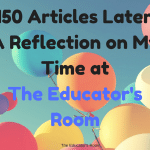 Recently, Jake Miller and I wrote two articles that were simultaneously published, entitled “What Frustrates Me About Non-Public Schools” and “What Bothers Me About Public Schools,” respectively. Many comments were made on both of these articles, the theme of most being in agreement with a majority of the issues listed in both arenas.
Recently, Jake Miller and I wrote two articles that were simultaneously published, entitled “What Frustrates Me About Non-Public Schools” and “What Bothers Me About Public Schools,” respectively. Many comments were made on both of these articles, the theme of most being in agreement with a majority of the issues listed in both arenas.
My question to our readers is: If there are so many teachers who agree that a change needs to be made, how can we go about seriously making that change?
I had no qualms at all about writing my end, seeing as how I kissed the public school, and accredited private school for that matter, good-bye nine years ago and started my own school. Granted I was in a very blessed position to be able to do that, and I know that a majority of teachers either don’t have the resources readily available or keep running into red tape with an idea such as this, but the fact still remains that we are crying for a change.
So what needs to be done?
We can’t go to our principals because they are either fighting the same battle we are and not getting anywhere, or they are so politically minded that they don’t want to get their hands dirty.
We can go to our unions, if unions are available, but there are no guarantees that the union will be 100% on our sides. Unions are either all in or all out and are more interested in PR than anything. If they are all in on helping teachers try to establish a change usually politics gets in the way, and, well, we all know how that pans out.
It seems as if it does no good to go to legislature anymore. After all lobbyists, representatives and senators are playing a game where the children will always be the losers. They may talk a good talk, and might even throw a bill out there. But we all know that when it comes to actually taking action, most are back pedaling as quickly as possible and that bills get rewritten so many times that they eventually lose their meaning.
So where do we go and to whom do we need to speak with? How do we get the non-classroom folks removed from making classroom decisions? How do we convince not only the school administration and congress that education is a valuable resource and a true privilege, but also our children, school families, other teachers and principals who are sick of school and all it stands for?
I feel like we are stuck in George Orwell’s novel 1989 where Big Brother is hovering over us, daring us to take a stand, and most of us either don’t know what to do or are afraid to act on what we know needs to be done. Teachers are being put in very precarious positions of the possibility of losing their jobs if they are deemed to be stepping out of line, or not ‘making the grade’. There were several comments made about school systems in other countries doing well. One reader even said that we are comparing “apples to oranges” because other countries have a “want-to” attitude about education whereas the United States has an “I can do it better” attitude, going back to the family unit. Another reader says that the entire “public school system should be nuked” and that we should just start over.
We know that we can’t force the same belief system on everyone in our vast melting pot that we call the United States. Some families will never see the value of education. Some politicians will never see the value of education. Some teachers have completely lost the value of education.
So where do we start?
I believe the only place we can start is with the kids we have. Figuring out how to instill the value of learning into the hearts and minds of our children will allow those values to be practiced and passed on to their families, which in turn will trickle out to everyone else who is involved in creating all of the obscene ‘requirements’ that are being presented to apparently all teachers in the United States.
Leader and businessman John Porter said, “People underestimate their capacity for change. There is never a right time to do a difficult thing.”
I don’t know about you, but I don’t want to fall into the category of underestimating myself and I sure don’t shirk away from doing difficult things. After all, I AM a teacher.
Suggestions?




Thank you for your post. I agree with you 100%. The bottom line is that every school should be about is “growing students.” Everyone wants a quick fix or a program to fix the deep academic, social, emotional, physical and spiritual needs of our society. Unfortunately, it doesn’t work that way. Nothing worth having is ever easy. It takes work on all parties (parents, too) to grow students. We need to ask more questions and then be willing to take the next step to answer them.
Why do we think one size has to fit all?
Can we get away from the “tube sock” mentality and move into customized education?
What would customized education look like and how can it be achieved?
Does the government have all the answers or is it going to take risk takers to move out and invest in quality education in a different way?
What is school for? Can school look different than how we did school twenty years ago?
What will our kindergarteners have to be able to do in the year 2025?
What jobs will be available in 2029? Do all kids have to go to college?
What are best practices? What are worst practices?
How much data do we really need? Why do we need data? What data is most important?
What are the needs of the students in your school?
How can you design a program around the needs of your students to optimize learning?
How should we evaluate teachers and grow them at a differentiated level?
What does “hands on “ professional development look like?
How does professional development impact student learning?
What could blended instruction look like to accelerate and remediate students?
What does transformational leadership by administrators and teachers working together look like?
The last and most important question is: How do you change the culture in your school? You change the people (you need the ability to do that quickly), change the language, and change the systems.
The answers to all of the above questions move a school forward.
It is too lengthy to answer these, but I can. It takes time and investment. But it also has to come down to individual schools, their needs, and giving leadership the ability to do what needs to be done to move the school forward. I believe that is where private/charter/magnet school not run by public domain can make the greatest gains. It begins and ends with teachers and students. The teacher/ student relationship is the most impacting relationship in education. Another valuable relationship is the administration/teacher , and the staff/parents.
The final component you need is time. Educators are always under a time crunch, but when growing anything valuable it takes time, patience, nurturing, pruning, nourishment, and persistence. Growing students is much more intricate and produces much more fruit. When we slow down and begin once again to value students first, take the time to teach them and develop relationships with them, we will see gains never measured on a standardized test.
Absolutely correct, Nikki! But how do we as teachers actually make those solutions happen?